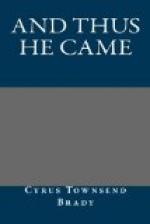The man’s arm fell. The room was empty after all. He stared at the little shoe. Was it somewhere well with the child, with its mother? Unbuttoning his tunic he thrust the little shoe within, over his heart. He straightened up. Away off on the road a bugle call rang out above the tumult. He turned away, seized his rifle, shouldered it, stepped rapidly toward his regiment and his duty.
VII
The Thorn Crowned
“The soldiers platted A Crown of thorns and put it on his head”
VII
The Thorn Crowned
It was ghastly cold in the ruined church. It had been warm enough there during the day, but the fire that had gutted it had died like the young acolyte, like the aged sacristan, the venerable mother, the sweet young novice, the women who had sought shelter there in vain. Neither the dignity of age nor the sweetness of maidenhood nor the innocence of youth nor the sanctity of profession had availed.
The old priest was glad they were dead. Life after what they had suffered had been unthinkable. He thanked God for that oblivion. He wished that he, too, might die in that violated shrine where he had peacefully ministered for so long a time. They had taken the flock, the shepherd must follow. He should have led.
He had fought, oh, he had played the man for the honor of the poor lambs committed to him. Had he done right? Should he not have stood dumb before the shearers? They had shot him and stabbed him and beaten him into insensibility. The last thing he had heard was the shriek of one woman, the piteous appeal of another. They thought he was dead, but he was living. Why had he not died?
How could God be so cruel? This was war. This ruined sanctuary, these broken men and women who had sought only to serve Him! Was there a God indeed? Faith, hope, what were they? Assurance, trust? Words, words! Ah, how he suffered.
[Illustration: “It is He,” whispered the priest. “His sorrow was greater than mine.”]
It was bitter cold and yet he burned with fever. The tremors of pain so exquisite that they might almost be counted pleasure shot through his ruined, torn, broken figure, yet he recked little of these. It was the shame, the shame. He had been zealous for the Lord of Hosts. There was no God. Men were not made in any image save that of hell. He could not move hand or foot, but he could see. He could speak. He could curse God and die.
As his lips framed that anathema he saw vaguely the figure of a stranger; a slender, wasted body, dark stains upon it in the moonlight. It wore some kind of curious headgear. The man stared. The light was reflected from the sharp points of long thorns. A cloth was fastened about the loins. The figure stood very straight in the desecrated Holy of Holies. A light seemed to come from its face. Its eyes looked at the man with great pity. Slowly the figure raised its arms. Slowly the arms extended themselves; there were blood-stains in the palms of the hands.




